Global Fast Food Market and Its Effects: Nursing Perspective
VerifiedAdded on 2023/03/30
|7
|1365
|364
Essay
AI Summary
This assignment examines the global fast food market and its detrimental effects, focusing on the lack of shared responsibility for the common good. It critiques the issue, highlighting challenges like obesity and related medical complications, and proposes solutions from a nursing perspective. The paper emphasizes the role of nurses in promoting health awareness, advocating for policy changes, and engaging communities to address the risks associated with fast food consumption. It calls for the implementation of strategies such as nutrition labeling, global policies, and the involvement of intermediate institutions to achieve the common good. The assignment underscores the importance of human dignity and the application of relevant principles, such as the call to family, community, and participation, to realize the goal of common good in addressing fast food effects globally. The paper also provides the role of nursing organizations to educate the masses globally on the risk posed by fast foods and advocate for global policies.
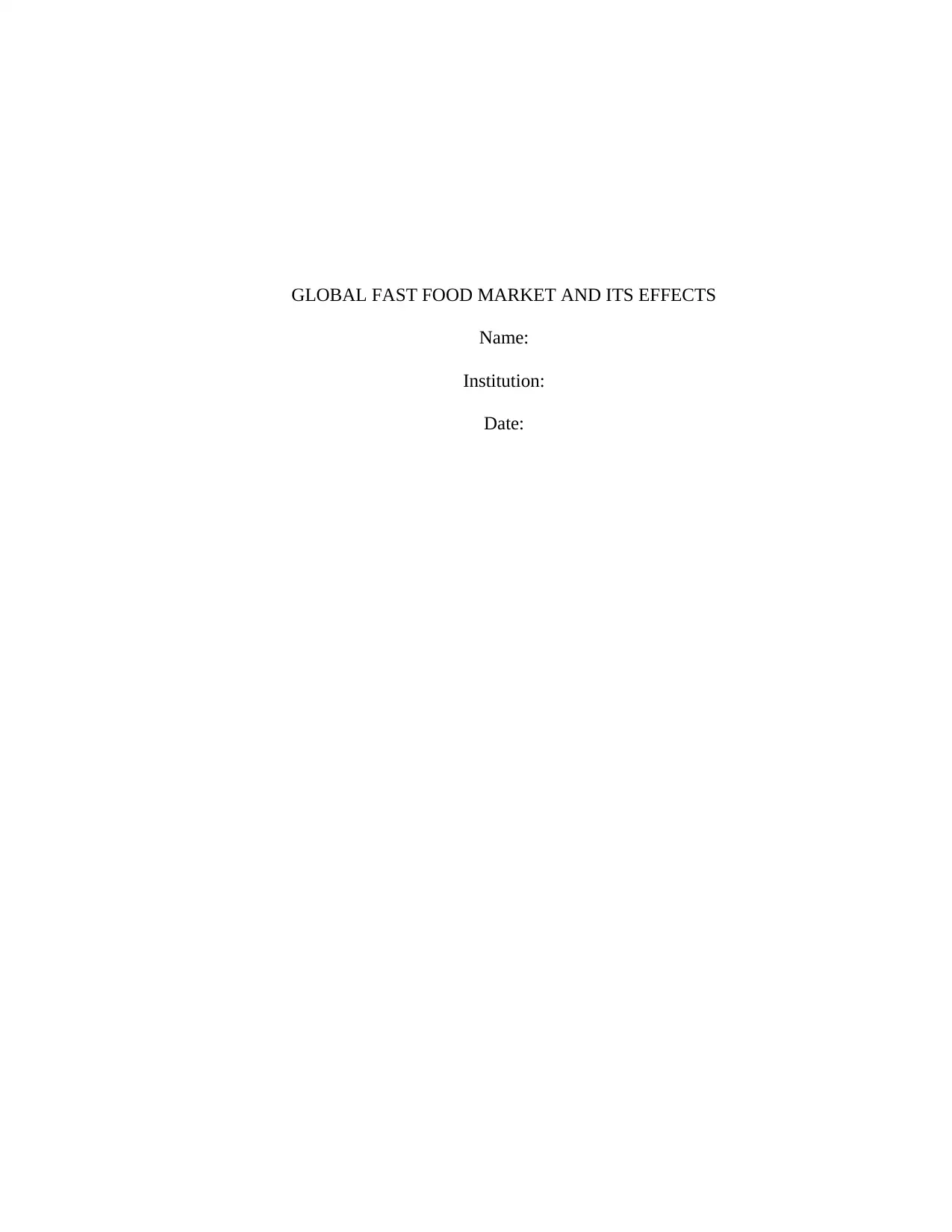
GLOBAL FAST FOOD MARKET AND ITS EFFECTS
Name:
Institution:
Date:
Name:
Institution:
Date:
Paraphrase This Document
Need a fresh take? Get an instant paraphrase of this document with our AI Paraphraser
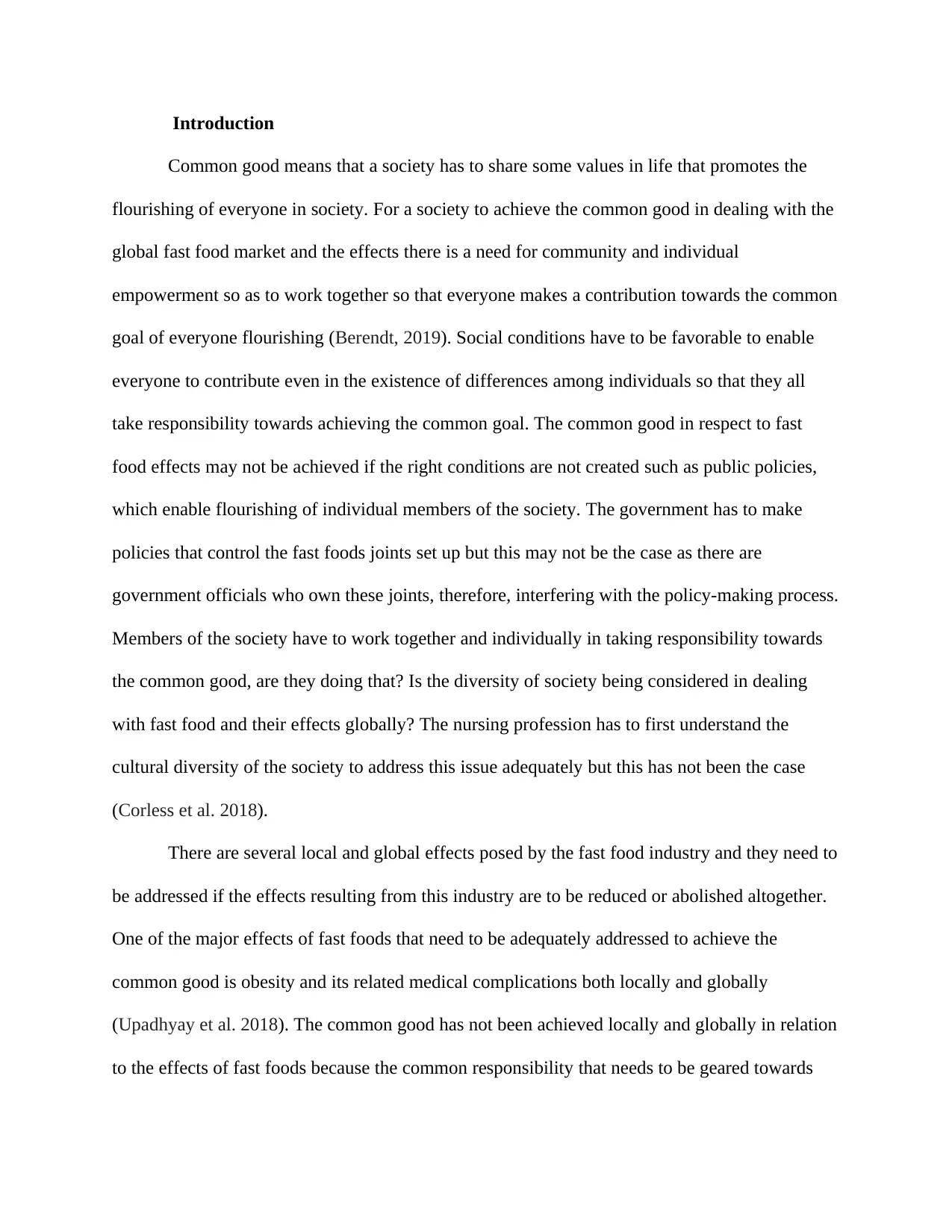
Introduction
Common good means that a society has to share some values in life that promotes the
flourishing of everyone in society. For a society to achieve the common good in dealing with the
global fast food market and the effects there is a need for community and individual
empowerment so as to work together so that everyone makes a contribution towards the common
goal of everyone flourishing (Berendt, 2019). Social conditions have to be favorable to enable
everyone to contribute even in the existence of differences among individuals so that they all
take responsibility towards achieving the common goal. The common good in respect to fast
food effects may not be achieved if the right conditions are not created such as public policies,
which enable flourishing of individual members of the society. The government has to make
policies that control the fast foods joints set up but this may not be the case as there are
government officials who own these joints, therefore, interfering with the policy-making process.
Members of the society have to work together and individually in taking responsibility towards
the common good, are they doing that? Is the diversity of society being considered in dealing
with fast food and their effects globally? The nursing profession has to first understand the
cultural diversity of the society to address this issue adequately but this has not been the case
(Corless et al. 2018).
There are several local and global effects posed by the fast food industry and they need to
be addressed if the effects resulting from this industry are to be reduced or abolished altogether.
One of the major effects of fast foods that need to be adequately addressed to achieve the
common good is obesity and its related medical complications both locally and globally
(Upadhyay et al. 2018). The common good has not been achieved locally and globally in relation
to the effects of fast foods because the common responsibility that needs to be geared towards
Common good means that a society has to share some values in life that promotes the
flourishing of everyone in society. For a society to achieve the common good in dealing with the
global fast food market and the effects there is a need for community and individual
empowerment so as to work together so that everyone makes a contribution towards the common
goal of everyone flourishing (Berendt, 2019). Social conditions have to be favorable to enable
everyone to contribute even in the existence of differences among individuals so that they all
take responsibility towards achieving the common goal. The common good in respect to fast
food effects may not be achieved if the right conditions are not created such as public policies,
which enable flourishing of individual members of the society. The government has to make
policies that control the fast foods joints set up but this may not be the case as there are
government officials who own these joints, therefore, interfering with the policy-making process.
Members of the society have to work together and individually in taking responsibility towards
the common good, are they doing that? Is the diversity of society being considered in dealing
with fast food and their effects globally? The nursing profession has to first understand the
cultural diversity of the society to address this issue adequately but this has not been the case
(Corless et al. 2018).
There are several local and global effects posed by the fast food industry and they need to
be addressed if the effects resulting from this industry are to be reduced or abolished altogether.
One of the major effects of fast foods that need to be adequately addressed to achieve the
common good is obesity and its related medical complications both locally and globally
(Upadhyay et al. 2018). The common good has not been achieved locally and globally in relation
to the effects of fast foods because the common responsibility that needs to be geared towards
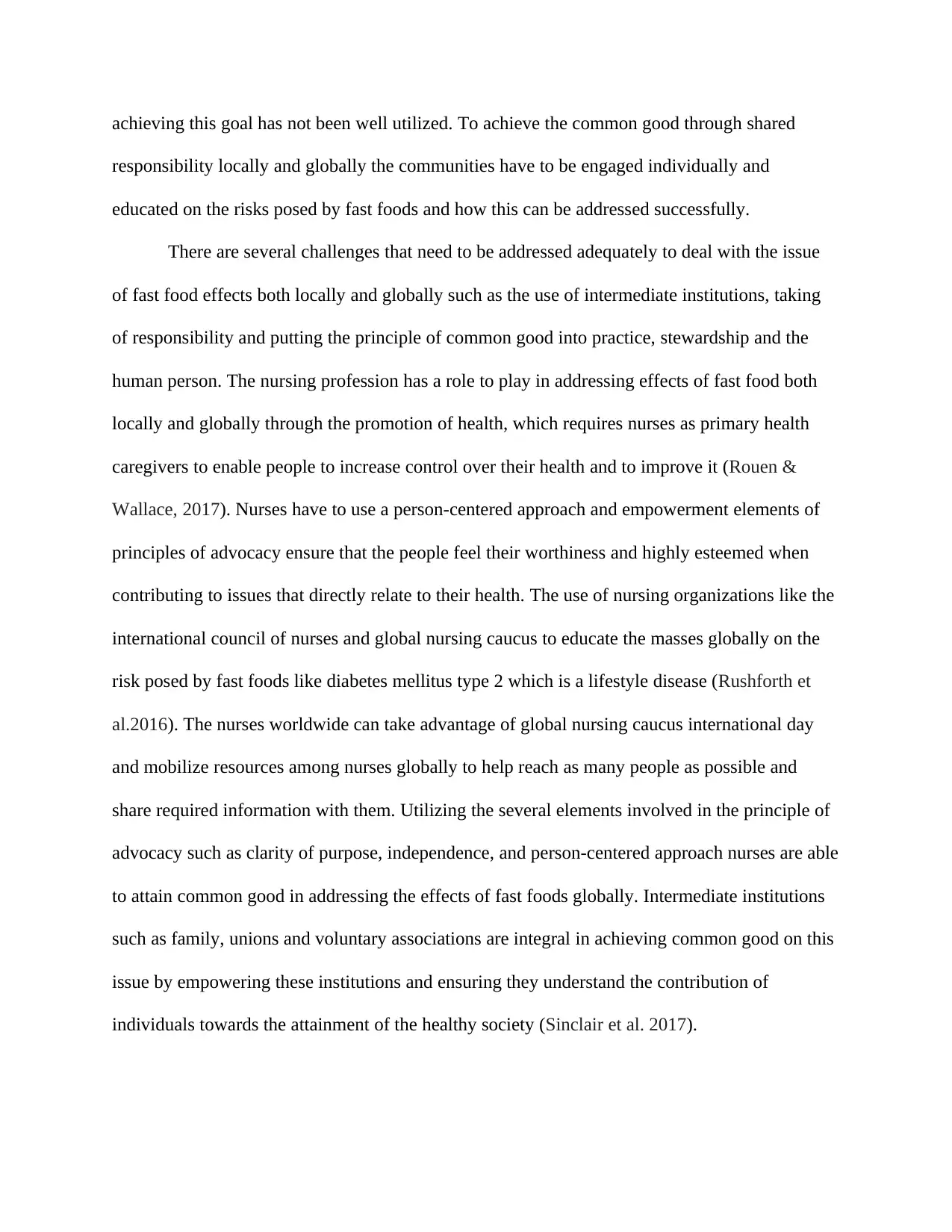
achieving this goal has not been well utilized. To achieve the common good through shared
responsibility locally and globally the communities have to be engaged individually and
educated on the risks posed by fast foods and how this can be addressed successfully.
There are several challenges that need to be addressed adequately to deal with the issue
of fast food effects both locally and globally such as the use of intermediate institutions, taking
of responsibility and putting the principle of common good into practice, stewardship and the
human person. The nursing profession has a role to play in addressing effects of fast food both
locally and globally through the promotion of health, which requires nurses as primary health
caregivers to enable people to increase control over their health and to improve it (Rouen &
Wallace, 2017). Nurses have to use a person-centered approach and empowerment elements of
principles of advocacy ensure that the people feel their worthiness and highly esteemed when
contributing to issues that directly relate to their health. The use of nursing organizations like the
international council of nurses and global nursing caucus to educate the masses globally on the
risk posed by fast foods like diabetes mellitus type 2 which is a lifestyle disease (Rushforth et
al.2016). The nurses worldwide can take advantage of global nursing caucus international day
and mobilize resources among nurses globally to help reach as many people as possible and
share required information with them. Utilizing the several elements involved in the principle of
advocacy such as clarity of purpose, independence, and person-centered approach nurses are able
to attain common good in addressing the effects of fast foods globally. Intermediate institutions
such as family, unions and voluntary associations are integral in achieving common good on this
issue by empowering these institutions and ensuring they understand the contribution of
individuals towards the attainment of the healthy society (Sinclair et al. 2017).
responsibility locally and globally the communities have to be engaged individually and
educated on the risks posed by fast foods and how this can be addressed successfully.
There are several challenges that need to be addressed adequately to deal with the issue
of fast food effects both locally and globally such as the use of intermediate institutions, taking
of responsibility and putting the principle of common good into practice, stewardship and the
human person. The nursing profession has a role to play in addressing effects of fast food both
locally and globally through the promotion of health, which requires nurses as primary health
caregivers to enable people to increase control over their health and to improve it (Rouen &
Wallace, 2017). Nurses have to use a person-centered approach and empowerment elements of
principles of advocacy ensure that the people feel their worthiness and highly esteemed when
contributing to issues that directly relate to their health. The use of nursing organizations like the
international council of nurses and global nursing caucus to educate the masses globally on the
risk posed by fast foods like diabetes mellitus type 2 which is a lifestyle disease (Rushforth et
al.2016). The nurses worldwide can take advantage of global nursing caucus international day
and mobilize resources among nurses globally to help reach as many people as possible and
share required information with them. Utilizing the several elements involved in the principle of
advocacy such as clarity of purpose, independence, and person-centered approach nurses are able
to attain common good in addressing the effects of fast foods globally. Intermediate institutions
such as family, unions and voluntary associations are integral in achieving common good on this
issue by empowering these institutions and ensuring they understand the contribution of
individuals towards the attainment of the healthy society (Sinclair et al. 2017).
⊘ This is a preview!⊘
Do you want full access?
Subscribe today to unlock all pages.

Trusted by 1+ million students worldwide
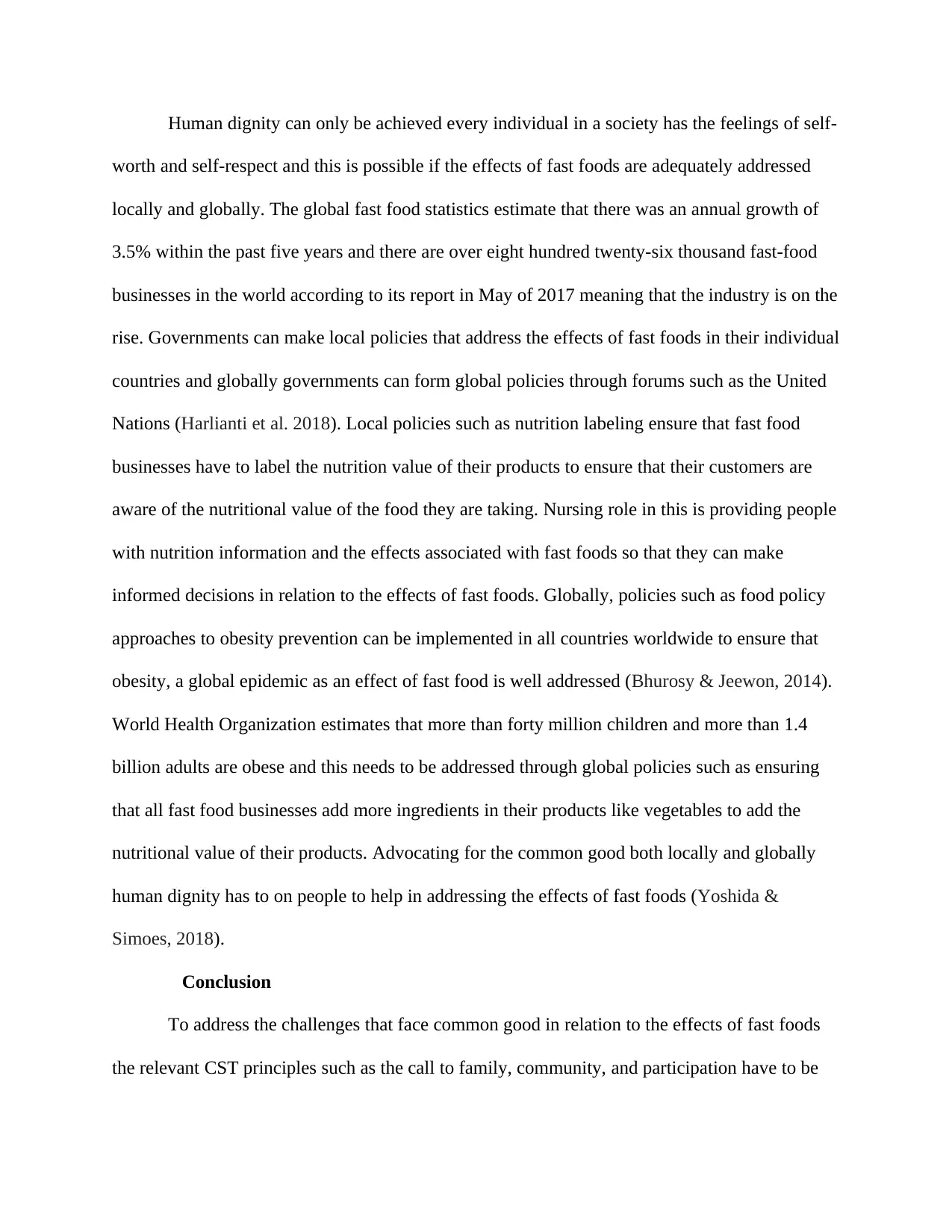
Human dignity can only be achieved every individual in a society has the feelings of self-
worth and self-respect and this is possible if the effects of fast foods are adequately addressed
locally and globally. The global fast food statistics estimate that there was an annual growth of
3.5% within the past five years and there are over eight hundred twenty-six thousand fast-food
businesses in the world according to its report in May of 2017 meaning that the industry is on the
rise. Governments can make local policies that address the effects of fast foods in their individual
countries and globally governments can form global policies through forums such as the United
Nations (Harlianti et al. 2018). Local policies such as nutrition labeling ensure that fast food
businesses have to label the nutrition value of their products to ensure that their customers are
aware of the nutritional value of the food they are taking. Nursing role in this is providing people
with nutrition information and the effects associated with fast foods so that they can make
informed decisions in relation to the effects of fast foods. Globally, policies such as food policy
approaches to obesity prevention can be implemented in all countries worldwide to ensure that
obesity, a global epidemic as an effect of fast food is well addressed (Bhurosy & Jeewon, 2014).
World Health Organization estimates that more than forty million children and more than 1.4
billion adults are obese and this needs to be addressed through global policies such as ensuring
that all fast food businesses add more ingredients in their products like vegetables to add the
nutritional value of their products. Advocating for the common good both locally and globally
human dignity has to on people to help in addressing the effects of fast foods (Yoshida &
Simoes, 2018).
Conclusion
To address the challenges that face common good in relation to the effects of fast foods
the relevant CST principles such as the call to family, community, and participation have to be
worth and self-respect and this is possible if the effects of fast foods are adequately addressed
locally and globally. The global fast food statistics estimate that there was an annual growth of
3.5% within the past five years and there are over eight hundred twenty-six thousand fast-food
businesses in the world according to its report in May of 2017 meaning that the industry is on the
rise. Governments can make local policies that address the effects of fast foods in their individual
countries and globally governments can form global policies through forums such as the United
Nations (Harlianti et al. 2018). Local policies such as nutrition labeling ensure that fast food
businesses have to label the nutrition value of their products to ensure that their customers are
aware of the nutritional value of the food they are taking. Nursing role in this is providing people
with nutrition information and the effects associated with fast foods so that they can make
informed decisions in relation to the effects of fast foods. Globally, policies such as food policy
approaches to obesity prevention can be implemented in all countries worldwide to ensure that
obesity, a global epidemic as an effect of fast food is well addressed (Bhurosy & Jeewon, 2014).
World Health Organization estimates that more than forty million children and more than 1.4
billion adults are obese and this needs to be addressed through global policies such as ensuring
that all fast food businesses add more ingredients in their products like vegetables to add the
nutritional value of their products. Advocating for the common good both locally and globally
human dignity has to on people to help in addressing the effects of fast foods (Yoshida &
Simoes, 2018).
Conclusion
To address the challenges that face common good in relation to the effects of fast foods
the relevant CST principles such as the call to family, community, and participation have to be
Paraphrase This Document
Need a fresh take? Get an instant paraphrase of this document with our AI Paraphraser
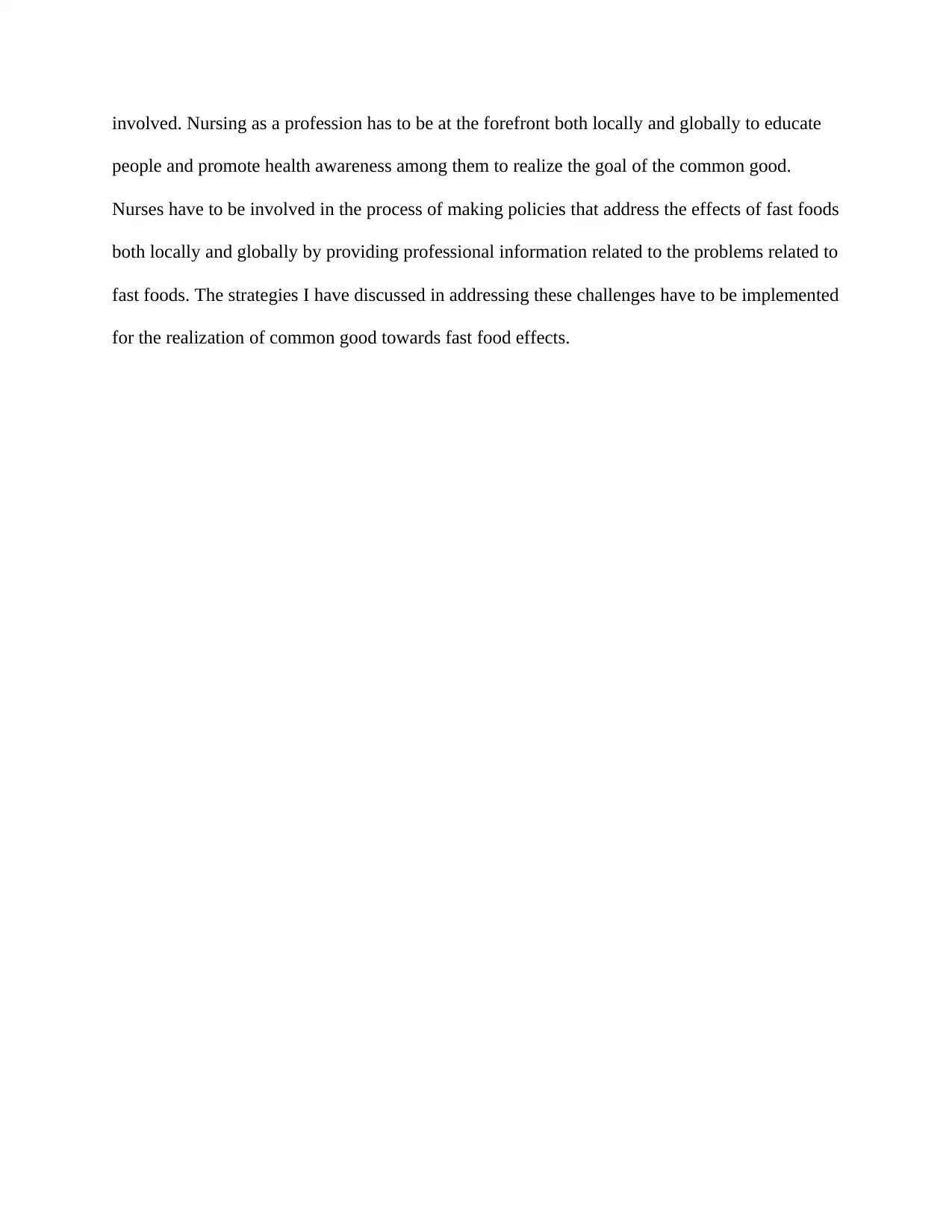
involved. Nursing as a profession has to be at the forefront both locally and globally to educate
people and promote health awareness among them to realize the goal of the common good.
Nurses have to be involved in the process of making policies that address the effects of fast foods
both locally and globally by providing professional information related to the problems related to
fast foods. The strategies I have discussed in addressing these challenges have to be implemented
for the realization of common good towards fast food effects.
people and promote health awareness among them to realize the goal of the common good.
Nurses have to be involved in the process of making policies that address the effects of fast foods
both locally and globally by providing professional information related to the problems related to
fast foods. The strategies I have discussed in addressing these challenges have to be implemented
for the realization of common good towards fast food effects.
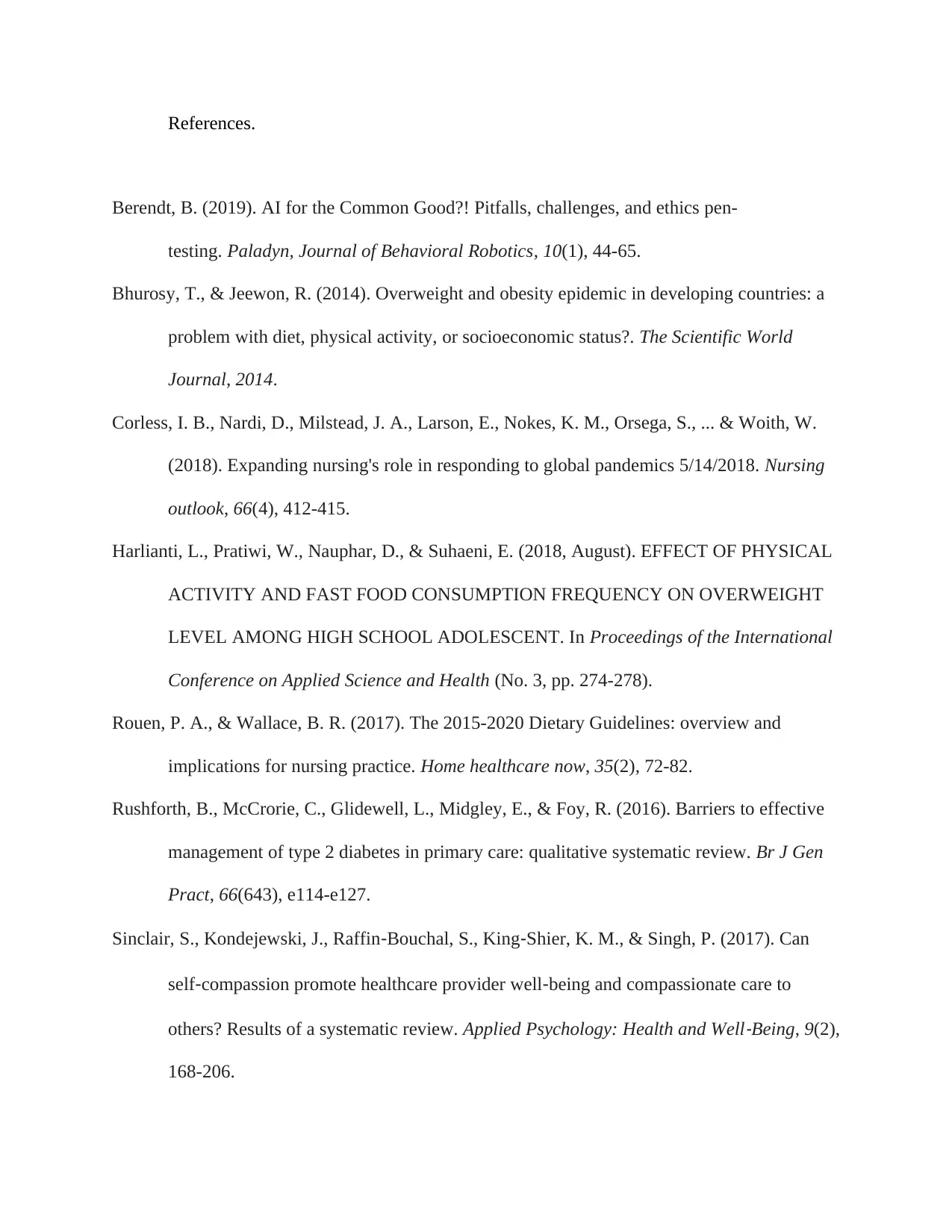
References.
Berendt, B. (2019). AI for the Common Good?! Pitfalls, challenges, and ethics pen-
testing. Paladyn, Journal of Behavioral Robotics, 10(1), 44-65.
Bhurosy, T., & Jeewon, R. (2014). Overweight and obesity epidemic in developing countries: a
problem with diet, physical activity, or socioeconomic status?. The Scientific World
Journal, 2014.
Corless, I. B., Nardi, D., Milstead, J. A., Larson, E., Nokes, K. M., Orsega, S., ... & Woith, W.
(2018). Expanding nursing's role in responding to global pandemics 5/14/2018. Nursing
outlook, 66(4), 412-415.
Harlianti, L., Pratiwi, W., Nauphar, D., & Suhaeni, E. (2018, August). EFFECT OF PHYSICAL
ACTIVITY AND FAST FOOD CONSUMPTION FREQUENCY ON OVERWEIGHT
LEVEL AMONG HIGH SCHOOL ADOLESCENT. In Proceedings of the International
Conference on Applied Science and Health (No. 3, pp. 274-278).
Rouen, P. A., & Wallace, B. R. (2017). The 2015-2020 Dietary Guidelines: overview and
implications for nursing practice. Home healthcare now, 35(2), 72-82.
Rushforth, B., McCrorie, C., Glidewell, L., Midgley, E., & Foy, R. (2016). Barriers to effective
management of type 2 diabetes in primary care: qualitative systematic review. Br J Gen
Pract, 66(643), e114-e127.
Sinclair, S., Kondejewski, J., Raffin‐Bouchal, S., King‐Shier, K. M., & Singh, P. (2017). Can
self‐compassion promote healthcare provider well‐being and compassionate care to
others? Results of a systematic review. Applied Psychology: Health and Well
‐Being, 9(2),
168-206.
Berendt, B. (2019). AI for the Common Good?! Pitfalls, challenges, and ethics pen-
testing. Paladyn, Journal of Behavioral Robotics, 10(1), 44-65.
Bhurosy, T., & Jeewon, R. (2014). Overweight and obesity epidemic in developing countries: a
problem with diet, physical activity, or socioeconomic status?. The Scientific World
Journal, 2014.
Corless, I. B., Nardi, D., Milstead, J. A., Larson, E., Nokes, K. M., Orsega, S., ... & Woith, W.
(2018). Expanding nursing's role in responding to global pandemics 5/14/2018. Nursing
outlook, 66(4), 412-415.
Harlianti, L., Pratiwi, W., Nauphar, D., & Suhaeni, E. (2018, August). EFFECT OF PHYSICAL
ACTIVITY AND FAST FOOD CONSUMPTION FREQUENCY ON OVERWEIGHT
LEVEL AMONG HIGH SCHOOL ADOLESCENT. In Proceedings of the International
Conference on Applied Science and Health (No. 3, pp. 274-278).
Rouen, P. A., & Wallace, B. R. (2017). The 2015-2020 Dietary Guidelines: overview and
implications for nursing practice. Home healthcare now, 35(2), 72-82.
Rushforth, B., McCrorie, C., Glidewell, L., Midgley, E., & Foy, R. (2016). Barriers to effective
management of type 2 diabetes in primary care: qualitative systematic review. Br J Gen
Pract, 66(643), e114-e127.
Sinclair, S., Kondejewski, J., Raffin‐Bouchal, S., King‐Shier, K. M., & Singh, P. (2017). Can
self‐compassion promote healthcare provider well‐being and compassionate care to
others? Results of a systematic review. Applied Psychology: Health and Well
‐Being, 9(2),
168-206.
⊘ This is a preview!⊘
Do you want full access?
Subscribe today to unlock all pages.

Trusted by 1+ million students worldwide
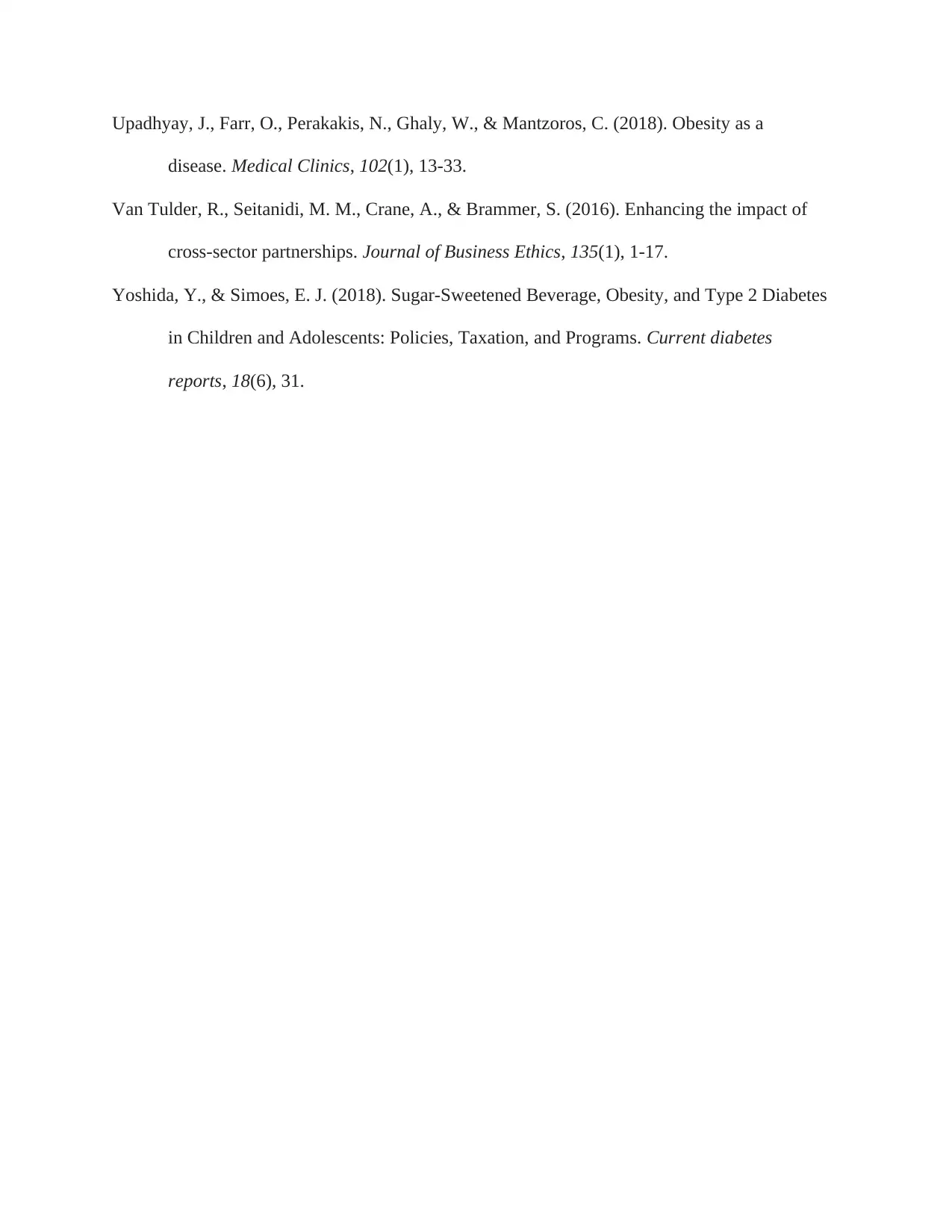
Upadhyay, J., Farr, O., Perakakis, N., Ghaly, W., & Mantzoros, C. (2018). Obesity as a
disease. Medical Clinics, 102(1), 13-33.
Van Tulder, R., Seitanidi, M. M., Crane, A., & Brammer, S. (2016). Enhancing the impact of
cross-sector partnerships. Journal of Business Ethics, 135(1), 1-17.
Yoshida, Y., & Simoes, E. J. (2018). Sugar-Sweetened Beverage, Obesity, and Type 2 Diabetes
in Children and Adolescents: Policies, Taxation, and Programs. Current diabetes
reports, 18(6), 31.
disease. Medical Clinics, 102(1), 13-33.
Van Tulder, R., Seitanidi, M. M., Crane, A., & Brammer, S. (2016). Enhancing the impact of
cross-sector partnerships. Journal of Business Ethics, 135(1), 1-17.
Yoshida, Y., & Simoes, E. J. (2018). Sugar-Sweetened Beverage, Obesity, and Type 2 Diabetes
in Children and Adolescents: Policies, Taxation, and Programs. Current diabetes
reports, 18(6), 31.
1 out of 7
Related Documents
Your All-in-One AI-Powered Toolkit for Academic Success.
+13062052269
info@desklib.com
Available 24*7 on WhatsApp / Email
![[object Object]](/_next/static/media/star-bottom.7253800d.svg)
Unlock your academic potential
Copyright © 2020–2026 A2Z Services. All Rights Reserved. Developed and managed by ZUCOL.





